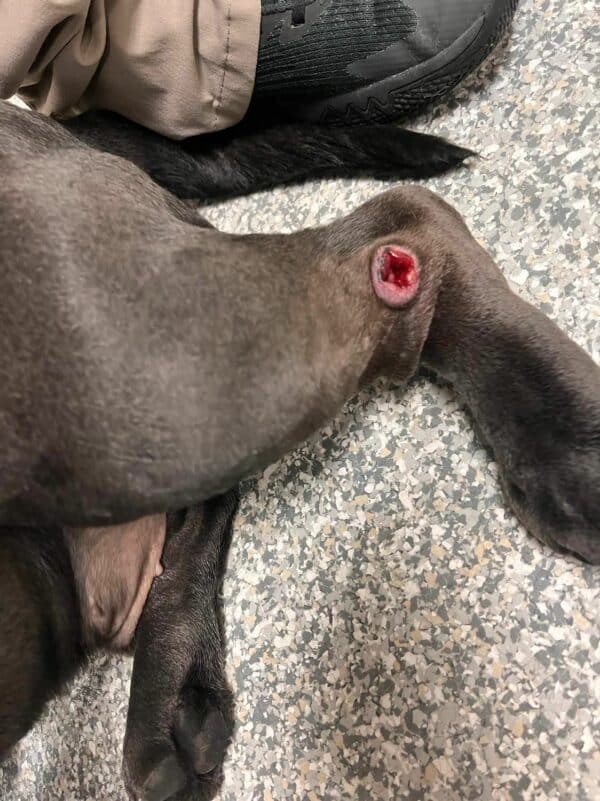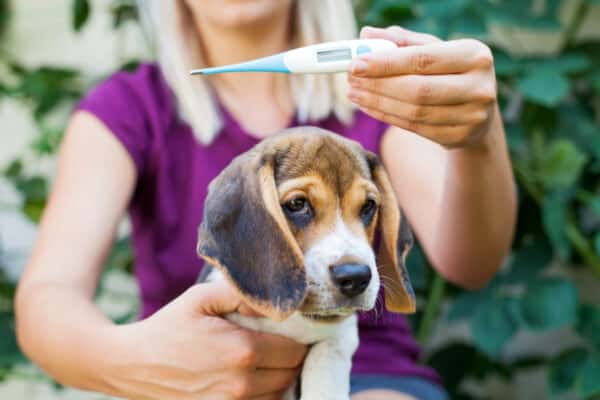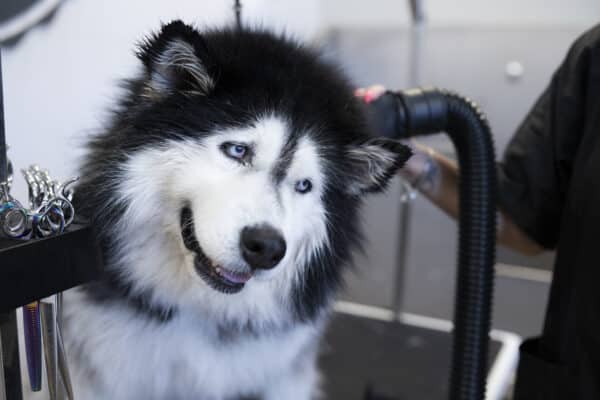Whether Fido turned the garbage bin into an all-you-can-eat buffet or accidentally swallowed his favorite plush pal, most dog owners have dealt with some form of gastrointestinal distress in their pet. But there are some prevalent stomach conditions, such as colitis in dogs, that dog guardians should be aware of as they can initially present themselves as all-too-familiar symptoms like diarrhea.
First, What Is Colitis?

According to Dr. Edward R. Maher, DVM, a veterinarian with VCA in California, colitis is an inflammatory disorder of the colon (large intestine). Colitis in dogs is classified as either acute — characterized by a sudden onset of symptoms, typically lasting for 72 hours — or chronic, where the dog has recurring symptoms that last for at least three weeks.
What Causes Colitis in Dogs?
“There are many different causes of colitis, including bacterial infections, parasites, fungal organisms (in some areas of the country), food sensitivities, inflammatory bowel disease or cancers,” explains Dr. Katherine Scott, DVM, a veterinarian with VCA in Colorado. “Even stress or anxiety may cause a temporary colitis.”
Dr. Marty Goldstein, DVM, author of The Nature of Animal Healing, agrees that one of the primary causes of colitis in dogs is parasites (particularly in younger dogs), but another is allergies.
In fact, one of the first lines of defense in treating chronic colitis in dogs is food allergy testing. “Food allergies can definitely cause symptoms of colitis, but with the pollen and grasses that come out this time of year, pet owners also have to realize that their dogs are ingesting a lot of those outdoor allergens … they’re running around outside and then licking their paws,” he explains.
Symptoms of Colitis in Dogs
So how do you know if your dog is showing symptoms of colitis? Dr. Scott advises dog parents to look out for soft stool or diarrhea, especially if it contains mucus or blood. Colitis in dogs is also associated with straining to defecate, or having smaller and more frequent bowel movements. “Many dogs with colitis still otherwise feel well, but other dogs with colitis will have vomiting, poor appetite or low energy levels,” she adds.
What Breeds Are More at Risk for Colitis?
Dr. Maher notes that colitis in dogs is more prevalent in certain breeds. The Boxer, for example, is known to be predisposed to a specific form of colitis caused by an E. Coli bacterial infection, while German Shepherd Dogs can be predisposed to the development of inflammatory bowel disease — and colitis can be a component.
“Pet owners should keep in mind that symptoms like diarrhea are the body’s way of detoxifying itself — so while that loose, mucous-y stool can definitely be concerning, it can also be a sign that your dog’s body is doing what it needs to do to get back on track,” Dr. Goldstein adds.
Diagnosis of Colitis in Dogs
If your dog has diarrhea or other gastrointestinal (GI) symptoms, a thorough diagnostic evaluation by your pet’s veterinarian can rule out the causes for either chronic or acute colitis in dogs. “A thorough history can identify acute causes, such as stress-related colitis or ‘garbage gut’ if your dog got into the trash,” explains Dr. Dawn Spangler, DVM, assistant professor of shelter medicine at Lincoln Memorial University College of Veterinary Medicine in Tennessee. “If it’s a more chronic case, a fecal exam to identify any intestinal parasites such as roundworms, hookworms or whipworms should be done initially.”
In addition to testing for parasites, Dr. Maher notes that your veterinarian may also perform antigen blood tests for giardia and histoplasmosis, a fecal culture for bacteria and fungal infections, genetic PCR testing for certain pathogenic bacteria, bacterial enterotoxin testing, fungal antibody testing, imaging studies like radiographs or abdominal ultrasound and ultimately a colonoscopy with a biopsy of the colon. “A clinical diagnosis of acute colitis is often based on an assessment of the symptoms as relayed by their owner, along with a physical examination of the patient and visual observation of fecal character,” he adds.
Treating — and Preventing — Colitis in Your Dog
Ultimately, the treatment for your pet will vary based on the cause of colitis in dogs. Dr. Spangler explains that prebiotics and probiotics can be useful to help the normal bacteria that live in the gut to re-establish after being disturbed by a colitis event. “Dewormers, antibiotics and anti-inflammatories will be prescribed to treat intestinal parasites, infections and inflammatory bowel disease, respectively,” she adds. A bland, low-fat diet may also be prescribed to reduce the work the GI tract has to do to break down the food; if a dietary intolerance is diagnosed, a specialized diet will be prescribed to treat the issue.
“Acute cases of stress-related colitis can be minimized by reducing stress with pheromones and anti-anxiety medications, preventing your dog from raiding the garbage can, and offering a commercially-available, nutritionally-balanced food,” Dr. Spangler says. Intestinal parasites can be controlled by keeping the yard picked up as well as by treating your pet with a monthly medication that includes parasite control, such as heartworm prevention. “Areas where dogs congregate, such as dog parks, can be a common place for dogs to pick up parasites and infections … so limiting time spent in these types of places can also reduce the risk for your pet,” she concludes.
Read more about dog health and care on Dogster.com:
- Probiotics for Dogs — Get the Facts
- 5 Times You Need a Pro Dog Groomer
- Kennel Cough Treatment — 4 Home Remedies for Kennel Cough
Featured Image Credit: AmyDreves | Thinkstock.





